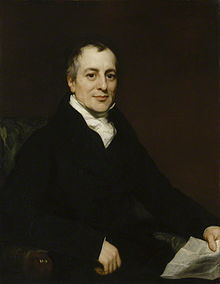
Back Рикардианска икономика Bulgarian Economía ricardiana Spanish اقتصاد ریکاردویی Persian リカード・モデル Japanese Model ricardiański Polish Modelo ricardiano Portuguese Ricardianska modellen Swedish Ekonomiyang Ricardiana Tagalog 李嘉图经济学 Chinese
This article includes a list of general references, but it lacks sufficient corresponding inline citations. (April 2012) |
| Part of a series on |
| Economic systems |
|---|
|
Major types
|

Ricardian economics are the economic theories of David Ricardo, an English political economist born in 1772 who made a fortune as a stockbroker and loan broker.[1][2] At the age of 27, he read An Inquiry into the Nature and Causes of Wealth of Nations by Adam Smith and was energised by the theories of economics.
His main economic ideas are contained in On the Principles of Political Economy and Taxation (1817). This set out a series of theories which would later become theoretical underpinnings of both Marx's Das Kapital and Marshallian economics, including the theory of economic rent, the labour theory of value and above all the theory of comparative advantage.
Ricardo wrote his first economic article ten years after reading Adam Smith and ultimately, the "bullion controversy" gave him fame in the economic community for his theory on inflation in 19th-century England. This theory became known as monetarism, the theory that excess currency leads to inflation.[1] He also played a part in the emergence of classical economics,[3] which meant he fought for free trade[4] and free competition without government interference by enforcing laws or restrictions.[2]
- ^ a b Henderson 826
- ^ a b Fusfeld 325
- ^ "Environmental Science | Glossary A-D".
- ^ "Glossary". Archived from the original on 2007-01-12. Retrieved 2006-12-03.
© MMXXIII Rich X Search. We shall prevail. All rights reserved. Rich X Search